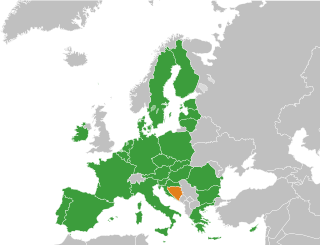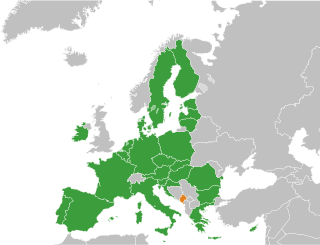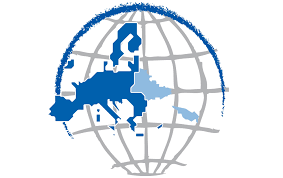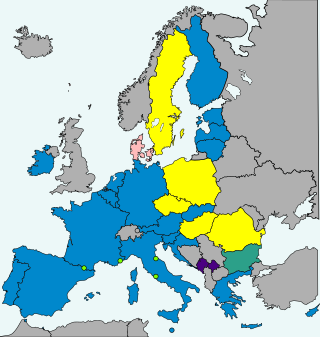Related Research Articles

The euro area, commonly called the eurozone (EZ), is a currency union of 20 member states of the European Union (EU) that have adopted the euro (€) as their primary currency and sole legal tender, and have thus fully implemented EMU policies.

The European Union (EU) has expanded a number of times throughout its history by way of the accession of new member states to the Union. To join the EU, a state needs to fulfil economic and political conditions called the Copenhagen criteria, which require a stable democratic government that respects the rule of law, and its corresponding freedoms and institutions. According to the Maastricht Treaty, each current member state and the European Parliament must agree to any enlargement. The process of enlargement is sometimes referred to as European integration. This term is also used to refer to the intensification of co-operation between EU member states as national governments allow for the gradual harmonisation of national laws.

The most recent enlargement of the European Union saw Croatia become the European Union's 28th member state on 1 July 2013. The country applied for EU membership in 2003, and the European Commission recommended making it an official candidate in early 2004. Candidate country status was granted to Croatia by the European Council in mid-2004. The entry negotiations, while originally set for March 2005, began in October that year together with the screening process.

Switzerland is not a member state of the European Union (EU). It is associated with the Union through a series of bilateral treaties in which Switzerland has adopted various provisions of European Union law in order to participate in the Union's single market, without joining as a member state. Among Switzerland's neighbouring countries, all but one are EU member states.

The visa policy of the Schengen Area is a component within the wider area of freedom, security and justice policy of the European Union. It applies to the Schengen Area and to other EU member states except Ireland. The visa policy allows nationals of certain countries to enter the Schengen Area via air, land or sea without a visa for up to 90 days within any 180-day period. Nationals of certain other countries are required to have a visa to enter and, in some cases, transit through the Schengen area.

The accession of Bosnia and Herzegovina to the European Union is the stated aim of the present relations between the two entities. Bosnia and Herzegovina has been recognised by the EU as a "candidate country" for accession since the decision of the European Council in 2022 and is on the current agenda for future enlargement of the EU. Bosnia and Herzegovina takes part in the Stabilisation and Association Process and trade relations are regulated by an Interim Agreement.

Accession of Montenegro to the European Union is on the agenda for future enlargement of the EU.

Between 1973 and 1993 the European Communities saw the first enlargement of the Communities. On 1 January 1973, Denmark, Ireland, and the United Kingdom became the first countries to join the Communities. The détente allowed initiation of the reunification of the continent through establishing the Conference on Security and Co-operation in Europe. Greece was the next to join EC on 1 January 1981, followed by Spain and Portugal joining on 1 January 1986, while Turkey has initiated the procedure in 1987. Upon the fall of the Iron Curtain, the CSCE was transformed in 1990 into Organization for Security and Co-operation in Europe, the Communities enlarged for a fourth time through the German reunification, while other former communist European countries stated their firm commitment to join, prompting formulation of the Copenhagen criteria. This period was, however, also the one which witnessed the first voluntary exit from the Communities, namely the one of Greenland in 1985. The integration progressed under the Delors Commission resulting in the creation of the European Union in 1993.

In general, the law of the European Union is valid in all of the twenty-seven European Union member states. However, occasionally member states negotiate certain opt-outs from legislation or treaties of the European Union, meaning they do not have to participate in certain policy areas. Currently, three states have such opt-outs: Denmark, Ireland and Poland. The United Kingdom had four opt-outs before leaving the Union.

The Schengen Area is an area comprising 27 European countries that have officially abolished passports and many other types of border control at their mutual borders. Being an element within the wider area of freedom, security and justice policy of the European Union (EU), it mostly functions as a single jurisdiction under a common visa policy for international travel purposes. The area is named after the 1985 Schengen Agreement and the 1990 Schengen Convention, both signed in Schengen, Luxembourg.

The accession of Kosovo to the European Union (EU) is on the current agenda for future enlargement of the EU. Kosovo is currently recognized by the EU as a potential candidate for accession.

There are nine recognised candidates for membership of the European Union: Albania, Bosnia and Herzegovina, Georgia, Moldova, Montenegro, North Macedonia, Serbia, Turkey, and Ukraine. Kosovo formally submitted its application for membership in 2022 and is considered a potential candidate by the European Union.

The history of the European Union between 1993 and 2004 was the period between its creation and the 2004 enlargement. The European Union was created at the dawn of the post–Cold War era and saw a series of successive treaties laying the ground for the euro, foreign policy and future enlargement. Three new member states joined the previous twelve in this period and the European Economic Area extended the reach of the EU's markets to three more.

In the European Union (EU), enhanced cooperation is a procedure where a minimum of nine EU member states are allowed to establish advanced integration or cooperation in an area within EU structures but without the other members being involved. As of October 2017, this procedure is being used in the fields of the Schengen acquis, divorce law, patents, property regimes of international couples, and European Public Prosecutor and is approved for the field of a financial transaction tax.

On 1 January 2007, Bulgaria and Romania became member states of the European Union (EU) in the fifth wave of EU enlargement.

The EuroNest Parliamentary Assembly is the inter-parliamentary forum in which members of the European Parliament and the national parliaments of Ukraine, Moldova, Armenia, Azerbaijan and Georgia participate and forge closer political and economic ties with the European Union. It was established in 2011 by the European Commission as a component of the Eastern Partnership. After the elections in Belarus in 2010 were declared as flawed by the OSCE, the membership of Belarus in Euronest was automatically suspended. Belarus is welcome to re-join the Assembly once political requirements have been fulfilled. In 2015, Azerbaijan's membership was suspended due to the European Union's criticism of human rights abuses by the government. In September 2016, it was announced that Azerbaijan would take the necessary steps towards restoring ties. As of 2017, the combined population of Euronest members stands at 61,927,521 people.

Croatia adopted the euro as its currency on 1 January 2023, becoming the 20th member state of the eurozone. A fixed conversion rate was set at 1 € = 7.5345 kn.

The United Kingdom was a member state of the European Union and of its predecessor the European Communities from 1973 until 2020. Since the foundation of the European Communities, it has been an important neighbour, and was a leading member state until its withdrawal from the EU on 31 January 2020 as a result of Brexit, ending 47 years of membership.
Events in the year 2023 in Croatia.
Events from 2023 in the European Union.
References
- ↑ "Croatia set to join the euro area on 1 January 2023: Council adopts final required legal acts". European Council/Council of the European Union. July 12, 2022. Retrieved July 16, 2022.
- ↑ "Schengen area: Council decides to lift border controls with Croatia". EU. Retrieved December 9, 2023.
- ↑ "Coronation on 6 May for King Charles and Camilla, Queen Consort". BBC News . Retrieved 2022-10-10.
- ↑ "28–29 October 2023 Partial Lunar Eclipse".